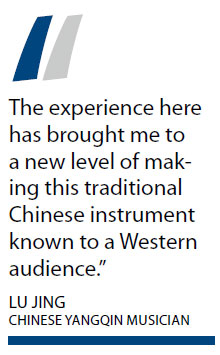Young yangqin master aims high
Updated: 2013-05-10 11:18
By Hu Haidan in New York (China Daily)
|
||||||||
|
At her concert on May 7 at Carnegie Hall, Lu Jing (right) played Chinese dulcimer with Zhou Yi, who played pipa. Provided to China Daily |

When Lu Jing applied for a Columbia University graduate program in stage management in 2010, her friends feared she might give up the musical instrument she had been playing since age 4.
But the musician knew she wouldn't put down the yangqin, a Chinese hammered dulcimer. In fact, studying in New York turned out to be propitious for a musician with a dream of reaching people around the world.
Tuesday night, Lu played in a recital theater inside Carnegie Hall, in a program combining Eastern and Western classical pieces such as "The General's Orders", Monti's "Csardas" and Rimsky-Korsakov's "Flight of the Bumblebee".
"I am so proud to say that I planned the dulcimer performance by myself. And I made it happen," Lu said, also referring to the crowd-funding for her concert that she initiated.
It was the latest success for the 26-year-old, who at age 12 entered the Central Conservatory of Music in Beijing - China's top music academy - with the highest possible admission-test score for her instrument.
Her youth was filled with performances and national and regional awards, including silver prizes for performance on a traditional Chinese instrument (2008, 2009) and a gold prize for "traditional instrumental music of youth" (2004).
But Lu said her focus is wider than a quest for accolades.
"I think one of the main reasons there are not many traditional Chinese instrument players on the world stage is that, because other than performing, we don't know much about popularizing," she said. "I don't want to become a person who can only play an instrument."
After receiving her bachelor's degree in musical performing arts from the Beijing conservatory, Lu set her sights higher.
"I'm not the kind of person who can sit there and wait for chances to come. I decided to learn the things behind stage performing and hope this new knowledge will help me to create more chances for playing the yangqin internationally."
While pursing her master's degree at Columbia, Lu enjoyed a life with plenty of nonmusical experiences.
She recalled the time last fall and winter when she got the idea for planning her own concert.
Lu had been selected as a production assistant for an off-Broadway revival of "Golden Child", by Chinese-American playwright David Henry Hwang. In that capacity, Lu said, she was a communication hub for the cast and crew.
"The most important thing I learned from that experience is how to make a show work from the very beginning," she said.
At a meeting to celebrate the revival's success, Lu brought along her yangqin and played for members of New York's Signature Theatre Company.
"People applauded for a long time," she recalled. "They told me they loved my performance and they said I should have my own concert."
Lu, too, figured it was time to apply the knowledge she had gained after more than two years in the United States. The planning began.
"I started contacting different concert halls and trying to raise money for my concert. I did face a lot of difficulty in making it finally happen, but it was definitely worth it."
By the time Tuesday night's concert in Weill Recital Hall was over, Lu left she had left an impression on the audience, which gave her a standing ovation.
"I am one step closer to my dream," she said afterward. "The experience here has brought me to a new level of making this traditional Chinese instrument known to a Western audience."
The ambitious musician wasn't content to stop at Carnegie Hall, however. Her calendar has three other concert dates this month, the soonest of which is May 19 when she will perform at a benefit in New Jersey for victims of the April 20 earthquake in Ya'an, Sichuan province, that killed almost 200 people.
Lu is also looking for opportunities to collaborate with Eastern and Western musicians
It is believed that China adapted the dulcimer over 400 years ago via the Silk Road trading route. Its origins may be in the clavichord, a stringed, keyboard instrument that dates to the late Medieval period in Europe. The yangqin's primacy in Chinese classical music is akin to the role of the piano in Western music. The Chinese instrument is performed either solo or with the erhu, pipa (both stringed) and flute-like dizi.
haidanhu12@chinadailyusa.com
(China Daily 05/10/2013 page11)

 Michelle lays roses at site along Berlin Wall
Michelle lays roses at site along Berlin Wall
 Historic space lecture in Tiangong-1 commences
Historic space lecture in Tiangong-1 commences
 'Sopranos' Star James Gandolfini dead at 51
'Sopranos' Star James Gandolfini dead at 51
 UN: Number of refugees hits 18-year high
UN: Number of refugees hits 18-year high
 Slide: Jet exercises from aircraft carrier
Slide: Jet exercises from aircraft carrier
 Talks establish fishery hotline
Talks establish fishery hotline
 Foreign buyers eye Chinese drones
Foreign buyers eye Chinese drones
 UN chief hails China's peacekeepers
UN chief hails China's peacekeepers
Most Viewed
Editor's Picks

|

|

|

|

|

|
Today's Top News
Shenzhou X astronaut gives lecture today
US told to reassess duties on Chinese paper
Chinese seek greater share of satellite market
Russia rejects Obama's nuke cut proposal
US immigration bill sees Senate breakthrough
Brazilian cities revoke fare hikes
Moody's warns on China's local govt debt
Air quality in major cities drops in May
US Weekly

|

|









